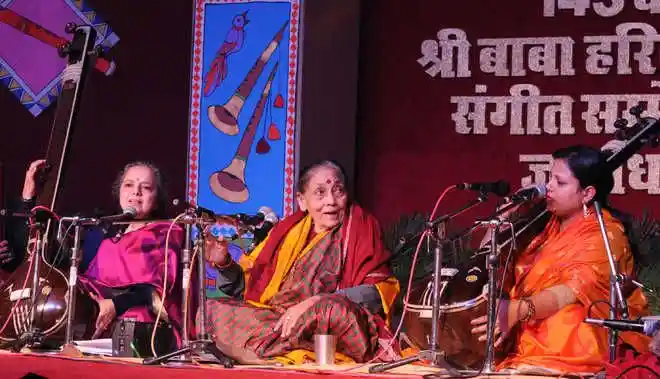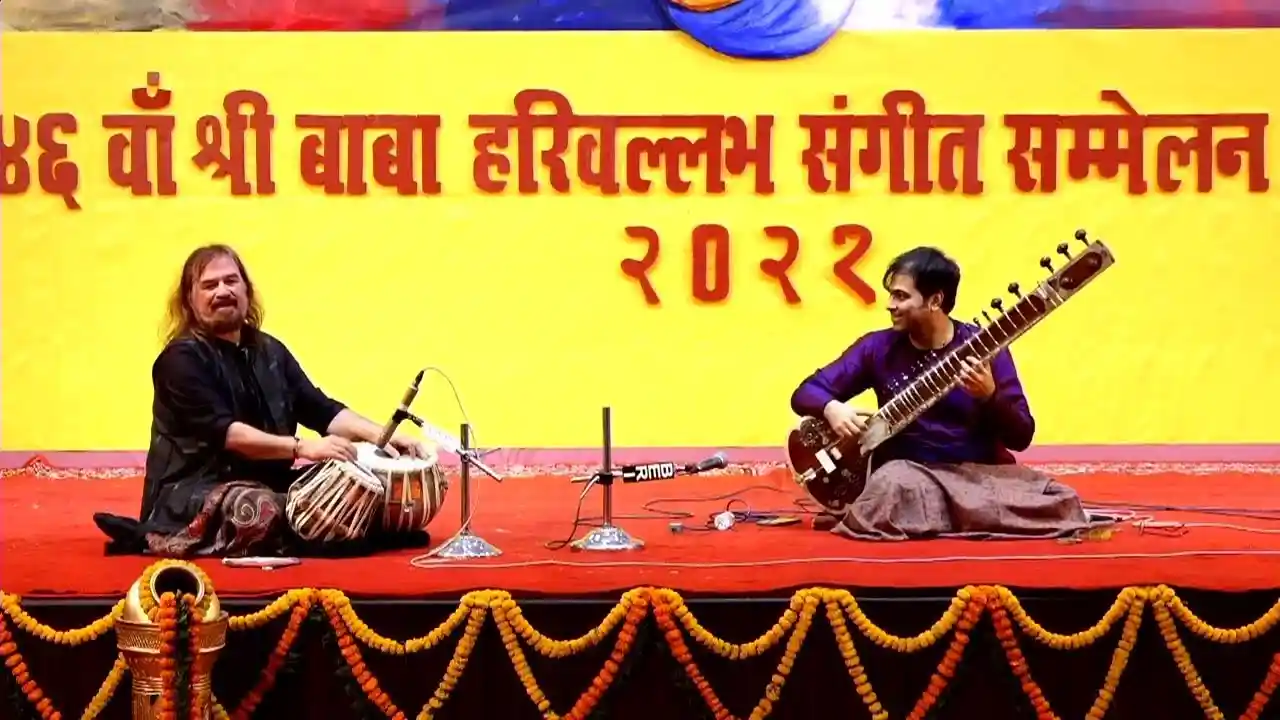Harballabh Sangeet Sammelan
The Harballabh Sangeet Sammelan is the world's oldest Hindustani Classical Music Festival. Held at the Devi Talab Mandir in Jalandhar, Punjab, it has been the place many of the world-renowned classical musicians of today performed their first concerts as students. But what is the festival about, and what is its origin story?

Image: Performance at the 144th Harivallabh Sangeet Sammelan, 27th December 2019. Source: TribuneIndia.
Pandit Bhaskar Rao, Pandit Krishna Rao, and Pandit Ram Krishna Buwa were meant to play for Mahatma Gandhi when he visited the event in 1919. Because Gandhi's arrival was delayed, the three stalwarts sang a bhajan in the Raga Khamaj, 'Ram Bhajan Ko Diya Kamal Mukh', which was dear to Bapu.
The celebration, which had begun on devotional lines, gained a new tradition in the 1930s: it always ended with the rendition of 'Vande Mataram.' Political developments had an impact on the artist community, and the Sammelan was a people's festival, sponsored by devotees, artists, and the public.
Due to the Partition in 1947, many Muslim artists, patrons, and a substantial segment of the audience fled. While the Muslims were fleeing, the Hindus and Sikhs who had come from the other side were traumatised.
It had a significant impact on the quality of the performances as well as the attendance of the audience. All five gharanas of Punjab vanished after being largely occupied by Muslim artists. At the time, the Sammelan ensured that regional performers were given a platform, allowing the Punjab gharana artists to showcase their talents. A void in the region had been created as a result of the large migration of Muslim artists to Pakistan.
This year marked a watershed moment in the festival's history. Padma Vibhushan Ashwini Kumar, IPS, was given the task of revitalising the festival in 1948, and he enlisted the help of the community, proposing numerous innovative programmes such as collecting one-rupee donations from individuals to help the Sammelan's dwindling riches. For 50 years, he was a member of the Baba Harballabh Mahasabha. Many Muslim artists who had fled to Pakistan returned to the festival to perform. Generations of performers from the same family have visited the Sammelan to pay their respects to the stage. Hundreds of local business people, entrepreneurs and professionals have helped maintain the festival's high standards over the years.
To the mystery of a great artist is that he will give away his energies and his life for reasons unknown just to make sure that one note follows another... and leaves us with the feeling that something is right in the world," Swami Harballabh said.
The concert's major goal was to attract and inspire more individuals to become involved in the development of classical music. The Sangeet Sammelan, which has been attracting audiences and artists from all over the country and overseas for the past 146 years, has grown from strength to strength. The Department of Tourism, Government of India, has recognised this festival as a National Festival. During the last 146 years, every major Hindustani Classical Music musician from India and Pakistan has performed in the Harballabh Sangeet Sammelan at some point. Union Ministers, Governors, State Chief Ministers, State Ministers, and other dignitaries have paid their respects at the music event. Every year, thousands of music fans from India and outside attend the festival. This figure keeps rising year after year.
The Harballabh Sangeet Sammelan is now 146 years old. Few music festivals can claim to represent the changes in India over the twentieth century as accurately as this one festival, which began in 1875 as a musical tribute to a saint complete with a yagna and havan. The celebration can still be seen in Devi Talab in the last week of December, however in a different form. Men and women sit in the pandal, draped in blankets and quilts, swaying to music that lasts till the early hours of the morning. In a land whose musical identity has become limited to bhangra-pop, they carry on a century-old practice of educated listening to classical music.
Nobody knows how the festival will develop by the time it celebrates its 150th anniversary, but one thing is certain: its music will remain intrinsically linked to India's history.

Image: Performance on the 2nd day of the 146th Harballabh Sangeet Sammelan Live Stream, 2021. Source: YouTube.


